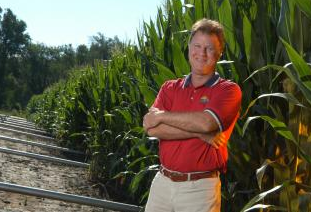
Rising food and energy prices, possible water shortages and changing climate have led many scientists to predict a global food crisis by 2050.
Despite dire predictions, agronomist Ken Cassman is optimistic that a resurging interest in agricultural research will help both small farmers in developing countries and larger producers in developed countries grow more food.
Yet such research investments will be effective only if scientists address the most critical issues and find practical solutions, especially in places with the greatest need for more food - parts of Asia, Sub-Saharan Africa and South America, Cassman said.
Cassman is thinking a lot about global food security these days. He recently was named to head the council responsible for advising a major network of international ag research centers. As the first chair of the new Independent Science and Partnership Council, Cassman will provide critical advice and expertise about the scientific merit and feasibility of global agricultural research projects to the Consultative Group on International Agricultural Research, known as CGIAR.
CGIAR is a consortium of 15 international research centers funded by governments, foundations, and international and regional organizations. The CGIAR research centers work to improve agricultural productivity, conserve natural resources and promote policies that stimulate agricultural growth in developing nations. The research centers include organizations such as the International Rice Research Institute, the International Water Management Institute and the International Crop Research Institute for the Semi-Arid Tropics.
The CGIAR Fund appointed Cassman in January to lead the seven-member council, which includes leading researchers in agriculture, environmental sciences, rural affairs and economics. Cassman is an internationally recognized expert in local and global food security, crop yield potential and biofuels.
The council's job is to help CGIAR funders identify agriculture development projects with the highest scientific quality and the greatest potential to increase farmers' incomes in poor, rural areas.
"To increase investment in agricultural research, we have to know our research priorities are correct and the science is being done well," Cassman said. Despite the billions of dollars invested in agriculture worldwide, he said Sub-Saharan Africa faces food shortages because crop yields haven't kept pace with rapidly growing populations. Getting new technologies from the laboratory to the field, and educating farmers about how to use them, is another challenge.
A similar scenario existed in the 1950s and 1960s, he said. International agricultural research centers responded by developing new "miracle crop" varieties and expanded irrigation infrastructure and use of fertilizers. Together they sustained a green revolution that rapidly improved agriculture production throughout the world. By the late 20th century, food was plentiful and inexpensive partly because of scientific advancements made decades earlier, Cassman said.
"Now we have a new set of challenges, and business as usual won't result in enough food supply to feed an incredibly dynamic world population," said Cassman, UNL's Heuermann Professor of Agronomy and Horticulture.
During his three-year term as chair, Cassman is helping the CGIAR Centers establish a portfolio of proven research projects that leverage various organizations' capabilities. For example, he said, a CGIAR research center may have expertise in improving rice varieties in Southeast Asia, but that expertise is also needed in Africa and even Latin America. The issue is how to establish global research partnerships with institutions around the world to get the job done.
Even with increased international concern for food security, he said, "this momentum will be a flash in the pan if we can't show that these projects address hunger and protect the world's environmental resources."
The council also is identifying emerging issues that need further research. For example, scientists need to develop ways to measure the environmental performance of cropping systems that address both the need to increase productivity and to reduce agriculture's environmental impact. Cassman said that addressing this challenge will shape his research priorities at UNL. It also will complement the work of the university's new global Water for Food Institute, a research, education and policy institute that focuses on the efficient use of water for agriculture.
"This is a huge opportunity for UNL to be at the forefront of emerging issues and it could expand our opportunities for international partnerships," he said.
- Ashley Washburn, Office of Research and Economic Development
- Ashley Washburn, Research and Economic Development